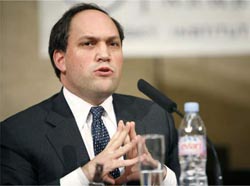The last quarter century has been a time of great change across the globe, much of which has been for the better. The number of electoral democracies has grown from 69 in 1989 to 118 today. Despite

How tragic it is, then, that so many tens of thousands remain effectively imprisoned in political concentration camps. North Korea, of course, is the world’s worst violator. According to the Guardian, the left’s flagship paper, up to 200,000 North Koreans remain imprisoned. CNN has detailed some of the ongoing horror in the six camps, and any report from the Committee for Human Rights in North Korea is worth reading. The Hermit Kingdom is not alone, though.
For decades, China has also maintained a series of “re-education through labor” [laojiao] camps. And while the Chinese government has recently promised to dismantle its network, actions ultimately speak louder than words.
The United States might have little leverage over China and North Korea, but low-hanging fruit which could be resolved with American diplomatic pressure does exist. The Mujahedin al-Khalq (MKO) is correct to castigate those who believe that the Iranian government or its militia proxies should enjoy an open season on group members. Opposing massacres is not synonymous with support for the group, however; it may no longer be a U.S.-designated terror group, but remains just as much an authoritarian cult. And while MKO spokesmen may castigate the Iraqi government and the Iranian regime, the real victims of the MKO lay within the group itself. Camp Liberty—the successor to Camp Ashraf—exists as much if not more to keep MKO members insulated from the real world and under the control of MKO leader Maryam Rajavi’s commissars than as a means of protection for group members.
Other camps exist in the Tindouf province of southwestern Algeria. Here, perhaps 40,000 residents of southern Morocco, Algeria, western Mali, and northern Mauritania languish in camps controlled by the once-Marxist Polisario Front, largely kept from returning home by the group’s political commissars and the Algerian government. During a recent visit to Dakhla, in Western Sahara, I had the opportunity to speak to former members who described not only their own escape from the camps, but the attempts by others who were forcibly returned to the camps, where Polisario authorities punished them for the audacity of seeking to return home rather than languish in camps 22 years after the war between Morocco and Algeria ended. Simply put, Polisario realizes that if the camps close, the gravy train of international assistance would end and the Polisario would lose its raison d’être.
The Polisario is not the only Cold War remnant stubbornly holding hostages. The Revolutionary Armed Forces of Columbia also engages in the practice, holding some prisoners for more than a decade. While some journalists parachute in and whitewash just what happens in FARC camps, it is hard to see “cultural programming” as anything other than an attempt at ideological re-education.
The Obama administration came into office seemingly committed to prioritizing human rights, never mind the debates about how best to guarantee rights, freedom, and liberty. The State Department became a revolving door not only for journalists, but for human-rights advocates, most notably Human Rights Watch’s Tom Malinowski and writer Samantha Power. Increasingly, however, it seems such figures are either window dressing for an administration so disinterested in human rights that it is willing to sanction political concentration and re-education camps or, worse yet, that these figures are so permeated by moral equivalency and skewed in their understanding of what universal human rights are that they are willing to normalize with the regimes, sponsors, and groups which engage in such practices.
Concentration camps and slavery (discussed in a previous post) are two phenomena that simply should not exist in the 21st century. That they do is a sad testament to the reality of regimes like North Korea’s, China’s, Algeria’s, Venezuela’s, and Cuba’s, and the choices which successive U.S. administrations–both Democrat and Republican–have made to not let such issues be stumbling blocks to engaging with the United States on other issues.
Michael Rubin, Commentary Magazine



